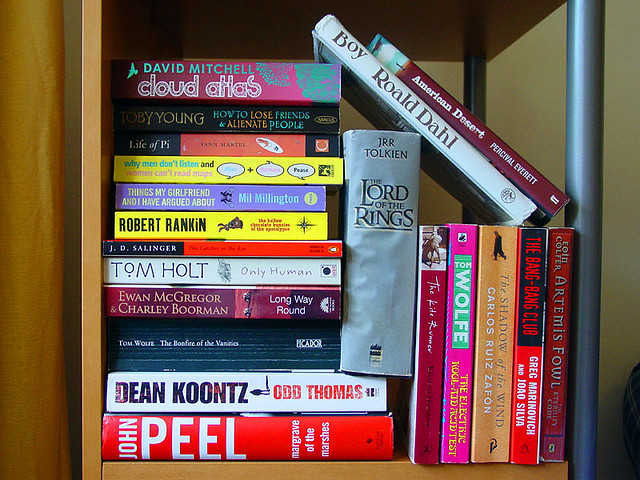A Good Publishing Contract
This last weekend I joined the fabulous Caitlin DiMotta at Emerald City Comicon to talk about publishing contracts.
And then the internet exploded talking about…publishing contracts!
A coincidence? I think not.
Obviously the internet is really bummed it missed our panel at Emerald City.
So for the benefit of all, here’s a short recap of what we talked about.
As always, this isn’t legal advice, just good advice, so please don’t go thinking either Caitlin or I are your attorney because of a blog post.
First things first: contracts are great and wonderful tools for helping to make sure everyone understands what they’re getting into, but they aren’t magical.
A contract is an agreement between two people about what they will (or won’t) do. If someone decides they’re going to break that agreement, they can do that. A contract, no matter how well written, can’t make someone do what they can’t, or don’t want to, do.
Let’s say you have a contract and you’re ready to jump in with both feet. What should you look for first?
Look at how the contract talks about three main points: time, money and ownership. In each of these areas the contract should reflect your basic understanding of the deal. If it doesn’t, put on the breaks and go back to the other party to figure out what’s going on.
With time make sure the start times and delivery dates make sense. And by “make sense” I mean “are humanly possible.” For a comic you probably can’t churn out 15 penciled, inked and colored pages a week; make sure your contract isn’t making that assumption. By the way, calling the work a “graphic novel” instead of a comic doesn’t make the feat any more feasible, but some publishers don’t always get that.
Regarding money, the go/no go questions are pretty basic: what will you be paid? and when will you be paid? If how the contract answers either of those questions is different from what you’d talked about, stop reading, pick up the phone and clear up the misunderstanding now.
Ownership is fairly straight forward, too: do they own this or do you? Both structures can be perfectly fine, but if the contract says something different from what you’ve been talking about, fix it before negotiations go any further.
Some people think they need to collect all of the different questions and concerns they have about a contract before they call the other side to clarify issues. Not so. If any of these basics are out of line, it makes sense to address them as early as possible.
If you’ve looked through the contract and the basic go/no go questions look alright, you can dig deeper into how the deal is structured.
For instance: you can get paid in a lot of different ways in publishing.
Advances are when you borrow money from your future-self. It’s an advance on the royalties you’re owed under the contract.
Once the book is out and selling like hot cakes, the profits will pay out in a fairly common hierarchy First, the publisher gets to recoup its costs, and what those costs are should be fairly well explained in the contract. After the costs are all paid, you’ll be eligible for royalties, usually a percentage of the profits from sales. If you get an advance, the book has to sell well enough that it generates enough royalties to pay back your advance before you’ll see any additional money.
Advances can be a great; they give you money to live on while you create the book, after all. But it’s important to realize where that money is coming from. Advances are most common where the creator is retaining his or her rights to the work.
A lump sum payment in contrast is more common when you’re not getting any ownership rights to the work. Instead you’re paid a certain set amount and once you’re paid you’re not entitled to any more money. It’s a common means of payment in a work for hire agreement. These sorts of deals can be good for paying the bills and getting good, paying work under your belt. But these aren’t the types of deals where you give them your most precious work you’ve been developing for the last 10 years and hope to get rich from it.
Occasionally in work for hire agreements you’ll find profit or sales incentives. These sorts of incentives are designed to encourage a creator to continue working on a particular project and to do work that might be a step or three above what they’d normally do for a work for hire piece. A profit or sales incentive gives the creator a right to a payment or a small royalty if the work sells at a particular level. If sales increase beyond that level, the payments or royalties can also increase.
Ownership of a work can also be carved up in a number of different ways.
Two of the most common ways you’ll see rights distributed in creator owned work are licenses and assignments.
A license is the right to use the work in a particular manner or for a particular period of time. With a license the creator remains the owner of the work and he or she gives permission to others to use the work. A license can be exclusive (only this particular person or entity has the right to do X) or nonexlcusive (the creator can give other people or entities the right to do X, too). Licenses are usually for limited periods of time and when they end we say they’re terminated [insert Terminator joke here].
Assignments, on the other hand, are when the creator gives his or her rights to the work to someone else. Assignments can be for the whole copyright or specific rights under the copyright, for instance the right to make a movie out of the work or the right to translate it into a particular language. When an assignment happens, it’s filed with the Copyright Office so, for example, everyone knows that the right to make a movie out of the Blackacre comic in Finnish now belongs to Sequential Films (hypothetically speaking, of course).
When an assignment ends it’s called a reversion because the rights are reverting to the creator. A reversion can happen as the result of time passing or because certain events happen. It’s common, for instance, that if a certain level of sales aren’t achieved in a particular time period the right to publish the work reverts to the creator.
Reversions aren’t automatically included in publishing contracts though. So if you want a reversion right, ask for it.
Finally, pay attention to what you’re prohibited from doing under the contract. For instance, does your contract require your exclusivity? Can you work for other companies or clients while under this contract?
Another often misunderstood (or not strenuously followed) prohibition is the confidentiality section. As I like to tell my clients, confidentiality means “shut your dang mouth, even and especially when you’re opening the third bottle of wine.” And yes, that means on Twitter, too.
Some contracts require you to only keep quiet about the project, others require you to not even talk about the fact that there is a project. Still others will prohibit you from admitting that the contract exists. Be sure you know what you can and cannot say under your contract.
Hopefully this helps shed a little bit more light on what to expect from a publishing contract.
Thanks again to Caitlin for developing the panel with me. Believe it or not, this is only about 60% of what we talked about! If you see Caitlin’s name in your next con program: GO! She’s aces.
Categories: Making Sense of Contracts









When facing an exciting opportunity with a lot of decisions to make, some authors and illustrators feel reluctant to negotiate, but there is nearly always room somewhere to improve terms in an agreement with the kinds of publishers you would want to work with. There is a lot of value to working with a good literary agent or publishing lawyer who might have a deeper impression of what is fair in the marketplace.